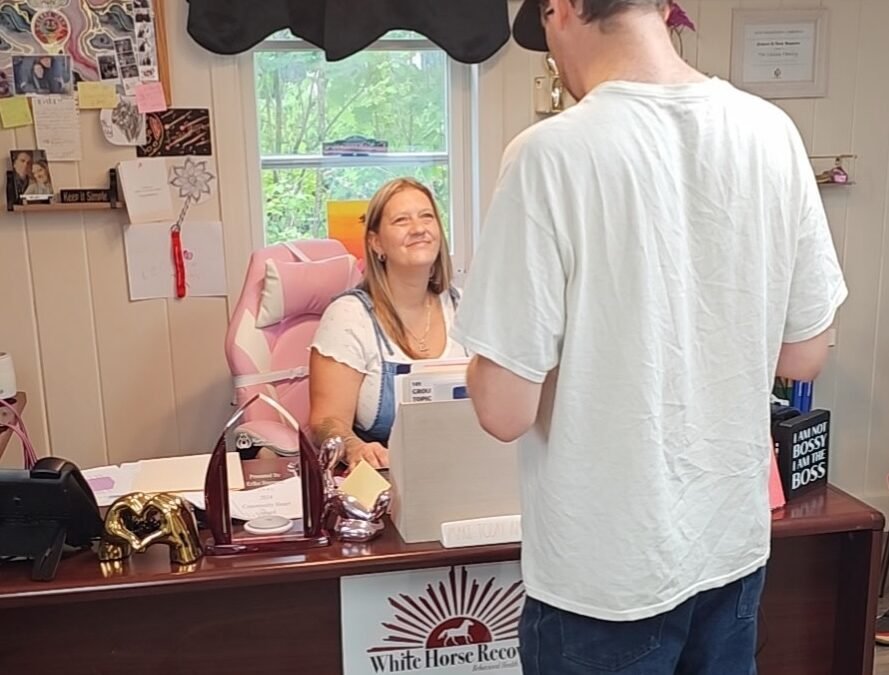How did your journey with White Horse begin?
I started working at White Horse in 2022, right after I moved to Littleton. I was in sober living and came to the center as a client. I took parenting classes and found support through a recovery-friendly workplace called Ten Foot. They helped me through the process of getting my son back. One day, Kate from White Horse mentioned they were hiring. I applied, got the job, and I’ve been here ever since.
What made White Horse such an important place for you in early recovery?
It was a safe space—not just for meetings, but to hang out and connect with people. Many of the people I was surrounding myself with were also coming here. It became a core part of my support system.
Can you share a bit about your background and how substance use became part of your story?
I moved here from Laconia and come from a large family with a history of substance use disorder. My parents were both severe alcoholics and separated when I was young. My childhood was full of partying and chaos. I had my first child at 16 and tried hard to be different from my parents. I managed for a while, but at 21, when I could legally drink, everything started to spiral. I went to rehab at 24, but lost custody of my first son, Caleb. That was the start of a long and painful journey.
What were some of the key moments in your recovery and relapse journey?
After losing custody of Caleb, I had a second child and used throughout the pregnancy. He was born with substances in his system. I served jail time and my aunt and uncle took him in. I kept using, got pregnant a third time, and finally got on Suboxone. I stayed clean for seven years, but I wasn’t in true recovery—I was just medicated. When my father died, I relapsed again—this time much worse, with meth, heroin, fentanyl, and IV use. I ended up in a shelter, and DCYF got involved again.
What finally helped you turn things around?
When I relapsed again and lost my son, it became nearly impossible to get into rehab. But I eventually made it to Littleton and started again. I worked really hard to get my son back. My partner and I stayed together, and I’ve now been clean for over three years. I became the manager of the center and a recovery coach. I’m working on my high school diploma so I can get my CRSW certification. It’s been a complete transformation.
What’s it like now working in the field of recovery?
Some days are incredibly rewarding, and some are draining. But helping people every day—just being a safe space for someone to do laundry, shower, or talk—is meaningful. Building trust is huge, especially when someone is deep in addiction. You have to walk with them, even if they’re not ready to take the next step right away.
What role does community play in recovery, in your experience?
It’s everything. You can’t recover alone. You need a network—detox, rehab, coaches, meetings, friendships. Breaking the stigma is also huge. When people feel seen and supported, they’re more likely to succeed. I’ve seen people move on, get jobs, and thrive while still rocking their recovery.
What are your future goals?
I want to finish my high school diploma and become a CRSW. One big goal is to work with drug court participants—people who would otherwise be incarcerated. Drug court is a great alternative that offers structure, support, and accountability. I want to be there for people just getting out of jail, so they have a better shot at life.
Tell us about your work with the Littleton Warming Shelter.
This past winter was the first season for the shelter. I serve on the board. We opened a 10-bed shelter for people experiencing homelessness. We saw up to 8 people stay there through the season. It’s been a powerful experience. In the mornings, people would come to White Horse for resources. Some weren’t ready for recovery, and that’s okay—we still welcome them. Meeting people where they are matters.
What keeps you going in this work?
Giving back. This center changed my life. I want to be a voice for people still struggling, and show them that recovery is real, and it’s possible. I never thought I’d be here—but I’m proud that I am.
If you or someone you know is struggling, you are not alone. White Horse Recovery offers services for those ready to start their journey to recovery. For more information, call 603-651-1441, Ext. 1.

